系动词
系动词
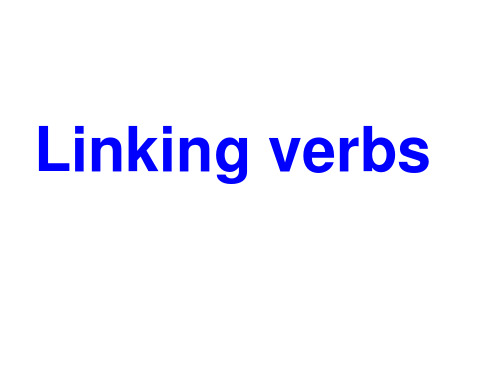
高考链接
1. (2007江苏) My parents have always made me ______ about myself, even when I was twelve. A. feeling well B. feeling good C. feel well D. feel good
8. Having a trip abroad is certainly good for the old couple, but it remains _______ whether they will enjoy it. (2002全国) A. to see B. to be seen C. seeing D. see
7. (2005辽宁) In the dark forests ________, some large enough to hold several English towns. A. stand many lakes B. lie many lakes C. many lakes lie D. many lakes stand
3. 能跟名词作表语的连系动词常见的 有:be, become, appear, seem, prove, remain和turn等。注意:turn后跟(表示主 语身份的)名词作表语时,不加冠词。 例如:
1.Twenty years later, he ned teacher. 2.The population growth in China remains a problem.
5). 表示延续意义的动词 keep, sit, stand, stay等。 这类动词加上一个表示状态的形容词,表示这 一状态的保持和延续。如: Doing exercise can keep healthy. 锻炼可保持健康。
系动词

系动词一.系动词定义:系动词亦称联系动词(Link Verb),作为系动词,它本身有词义,但不能单独用作谓语,后边必须跟表语(亦称补语),构成系表结构说明主语的状况、性质、特征等情况。
二.最常见系动词口诀:一"be":is am are四"变":get become turn go五"感官":feel taste smell sound look三.具体分类:1.表感官的系动词:look, sound, taste, smell, feel(这些词用形容词作表语)2.表似乎的系动词seem, appear3.表变化的系动词:become, get, turn, grow, make, come, go, fall, run4.表依旧的系动词:remain, keep, stay, continue, stand, rest, lie, hold5.可带名词作表语的系动词:become, make, look, sound, fall, prove, remain, turn(该词后接的单数名词前多不用冠词。
如:He turned teacher.)6.如果同学们对于这个语法现象还是不怎么理解的话,可以以这个名句为例子学学:the man who dies rich dies disgraced.在巨富中死去,是一种耻辱。
其中的rich and disgraced是说明主语的性质的。
1)状态系动词用来表示主语状态,只有be一词,例如:He is a teacher.他是一名教师。
(is与补足语一起说明主语的身份。
)2)持续系动词用来表示主语继续或保持一种状况或态度,主要有keep, rest,remain, stay, lie, stand,例如:He always kept silent at meeting.他开会时总保持沉默。
This matter rests a mystery.此事仍是一个谜。
系动词有哪些

系动词有哪些文/董玉莹系动词,也称连系动词(Linking verb),是用来辅助主语的动词。
它本身有词义,但不能单独用作谓语,其后必须跟表语,构成系表结构说明主语的状况、性质、特征等情况。
系动词的主要分类1)状态系动词用来表示主语状态,只有be一词,例如:He is a teacher. 他是一名教师。
(is与补足语一起说明主语的身份。
)2)持续系动词用来表示主语继续或保持一种状况或态度,主要有keep, remain, stay, lie, stand, 例如:He always keeps silent at meeting. 他开会时总保持沉默。
This matter remains a mystery. 此事仍是一个谜。
3)表像系动词用来表示"看起来像"这一概念,主要有seem, appear, look, 例如:He looks tired. 他看起来很累。
He seems (to be) very sad. 他看起来很伤心。
4)感官系动词感官系动词主要有feel, smell, sound, taste, 例如:This kind of cloth feels very soft.这种布摸起来很软。
This flower smells very sweet.这朵花闻起来很香。
5)变化系动词例如:He became mad after that. 自那之后,他疯了。
6)终止系动词表示主语已终止动作,主要有prove, turn out, 表达"证实","变成"之意,例如:The rumor proved false. 这谣言证实有假。
The search proved difficult. 搜查证实很难。
His plan turned out a success. 他的计划终于成功了。
(turn out表终止性结果)。
系动词
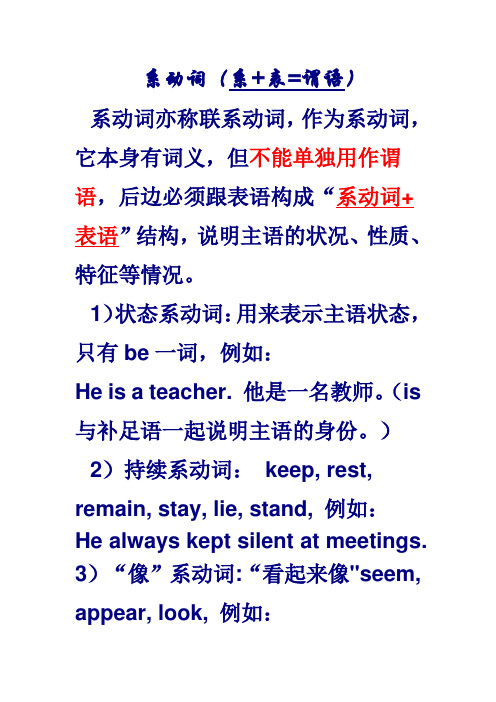
系动词(系+表=谓语)系动词亦称联系动词,作为系动词,它本身有词义,但不能单独用作谓语,后边必须跟表语构成“系动词+表语”结构,说明主语的状况、性质、特征等情况。
1)状态系动词:用来表示主语状态,只有be一词,例如:He is a teacher. 他是一名教师。
(is 与补足语一起说明主语的身份。
)2)持续系动词:keep, rest, remain, stay, lie, stand, 例如:He always kept silent at meetings. 3)“像”系动词:“看起来像"seem, appear, look, 例如:He looks tired.He seems (to be) very sad.4)感官系动词:feel, smell, sound, taste, 例如:This kind of cloth feels very soft. This flower smells very sweet.5)“变化”系动词:主语变成什么样,变化系动词主要有become, grow, turn, fall, get, go, come, run. 例如:He became mad 阿伯utEngliafter that.She grew rich within a short time. 6)终止系动词:表示主语已终止动作,主要有prove, trun out, 表达"证实","变成"之意,例如:The rumor proved false.The search proved difficult.His plan turned out a success.英语系动词的功能主要是把表语(名词、形容词、某些副词、非谓词、介词短语、从句)和它的主语联系在一起,说明主语的属性、特征或状态。
它有自己的但不完全的词义,不能在句中独立作谓语,必须和后面的表语一起构成句子的谓语(即:系+表=谓语)。
各种常用的系动词汇总
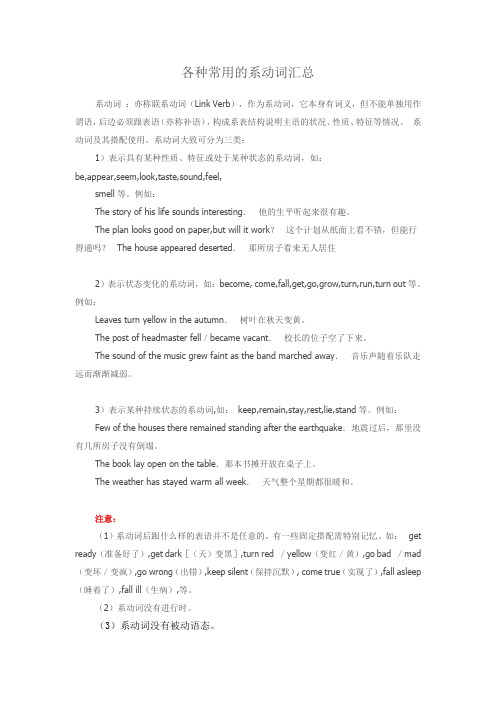
各种常用的系动词汇总系动词:亦称联系动词(Link Verb),作为系动词,它本身有词义,但不能单独用作谓语,后边必须跟表语(亦称补语),构成系表结构说明主语的状况、性质、特征等情况。
系动词及其搭配使用。
系动词大致可分为三类:1)表示具有某种性质、特征或处于某种状态的系动词,如:be,appear,seem,look,taste,sound,feel,smell等。
例如:The story of his life sounds interesting.他的生平听起来很有趣。
The plan looks good on paper,but will it work?这个计划从纸面上看不错,但能行得通吗? The house appeared deserted.那所房子看来无人居住2)表示状态变化的系动词,如:become, come,fall,get,go,grow,turn,run,turn out等。
例如:Leaves turn yellow in the autumn.树叶在秋天变黄。
The post of headmaster fell/became vacant.校长的位子空了下来。
The sound of the music grew faint as the band marched away.音乐声随着乐队走远而渐渐减弱。
3)表示某种持续状态的系动词,如:keep,remain,stay,rest,lie,stand等。
例如:Few of the houses there remained standing after the earthquake.地震过后,那里没有几所房子没有倒塌。
The book lay open on the table.那本书摊开放在桌子上。
The weather has stayed warm all week.天气整个星期都很暖和。
注意:(1)系动词后跟什么样的表语并不是任意的,有一些固定搭配需特别记忆。
常见系动词五大类

常见系动词五大类1 什么是系动词系动词是动词的一类,也叫作“情态动词”或“联系动词”,是起主要联系功能的词语,如:be,seem,look,sound,feel等,它们用来表示谓语句(即带有谓语动词的句子)中主语的状态,如可能性,质量,气氛等。
2 系动词的五大类1. 能力类。
表示“能够”的系动词,如:can,could,may,might,shall,should;2. 感觉类。
表示“感觉”的系动词,如:feel,hear,see,taste,smell;3. 情感类。
表示“情感”的系动词,如:like,love,dislike,hate;4. 状态类。
表示“状态”的系动词,如:appear,seem,look,sound,stay,keep;5. 礼貌类。
表示“礼貌”的系动词,如:let,shall,would,ought to,need等。
3 系动词的用法1. 系动词常位于句首,其后常跟着动词原形或不定式作谓语;2. 系动词与动词连用,构成谓语动词。
谓语动词表示主语情态或状态的变化;3. 系动词可以单独作谓语,如:He can read. 他会读书;4. 系动词可以同情态动词成句,如:I should have come earlier. 我本该早点来。
4 常见的系动词be,can,could,may,might,shall,should,will,would,must,ought to,had better,seem,look,feel,hear,taste,smell,like,love,dislike,hate,appear,stay,keep,let等。
5 系动词的重要性系动词是英语中最重要的词语之一,可以把句子中比较抽象的情态、状态、态度、环境或者其他类型的描述进行表达,为我们表达语句提供更多形式上的变化,有助于语句的简洁,增添句子的准确性和针对性,以及提高我们口语和写作水平。
所以学习和掌握系动词这一重要语法知识非常关键。
系动词

系动词一、分类1.表示状态变化的系动词。
become , get , go , grow , turn2.表示感官的系动词。
look , feel , smell ,sound , taste 3.表示持续的系动词。
keep , stay , remain二、用法1.系动词+adj2.系动词无被动※动词短语:1.动词+away构成的短语:throw away扔掉put away 把…收好give away 捐赠,分发carry away 运走run away 潜逃,跑开go away 走开2.动词+for构成的短语:call for提倡,要求plan for打算,为…计划hope for希望,期待ask for请求,寻找,需要send for派人去请go for努力获取pay for偿还,赔偿wait for等待look for寻找3.动词+on构成的短语:try on试穿,试验put on穿上,上演have on穿着,戴着hold on别挂断;坚持住carry on继续开展keep on继续go on继续get on上(车、船)come on赶快4.动词+over构成的短语:come over过来hand over移交go over仔细检查,复习get over克服,恢复look over检查think over仔细考虑take over接受,接管turn over翻转5.动词+up构成的短语:bring up抚育,培养call up召唤,打电话给come up走进,上来cut up切碎fix up修理give up放弃go up上升,增长grow up长大look up尊敬,向上看,查寻make up虚构,弥补,组成put up举起,搭建;张贴pick up捡起,(开车)接某人,偶然得到set up建立,创纪录send up发射show up揭露,露面turn up出现,把…调高一点take up占据;开始从事6.动词+out构成的短语:work out算出look out当心,小心turn out结果证明是put out扑灭,熄灭,伸出come out出来,开花,出版,发行break out战争、火灾、洪水爆发set out着手,出发,起程keep out把---挡在外面go out出去,熄灭wear out穿破run out用完give out放出、发出(光、热等);耗尽、用完;筋疲力尽7.break +介词/副词的短语:break down出故障,身体垮掉break out爆发break through突破,突围break off中断,突然停止break up打碎,分解,驱散break in打断,闯入break into破门而入break away突然离开,逃脱,脱离8.bring +介词/副词的短语:bring about使发生bring back拿回来,使恢复bring down打倒,降低,推翻bring in引进bring out出版,生产bring up培养,养育9.call +介词/副词的短语:call after以---命名call back召回call up征召入伍,给某人打电话,使想起call on号召,拜访某人call in召集call off取消e +介词/副词的短语:come in进来come from来自于come about产生come over过来come out出来,出现,出版come by从旁经过come up上来,走进come across偶遇come after跟着---来come back回来come around恢复知觉,回来come down下来,倒塌11.cut +介词/副词的短语:cut in插嘴,插入cut across抄近路cut off切断cut up切碎cut down砍倒,削减cut out切掉,裁剪出12.get +介词/副词的短语:get through通过,度过,打通(电话)get in进入,陷入get on上车,进展,融洽相处get off下车,下来get across通过,被理解get along进展,融洽相处get away离开,脱身13.give +介词/副词的短语:give up放弃give in屈服,投降give away赠送,捐赠,泄漏give over移交,交出give off放出(气味),发出give out分发,放出(光、热) give back归还14.go +介词/副词的短语:go ahead着手,开始(做),进行go along进展,前进go around到处走动,顺便访问go away离去,走开go beyond超过go by过去,流逝go down下降go up上升go for喜欢go off离开,停止go over复习,温习go through经历,穿过15.look +介词/副词的短语:look after照顾,照料look up查阅look around环顾look at看look down朝下看look for寻找look into调查look out当心look through浏览,检查16.take +介词/副词的短语:take away拿走take down写下,记下take in欺骗;吸收,吸纳take off起飞;脱下take on 承担;呈现;开始雇佣take over 接收,接管take pictures照相take care of照顾,照料take up 占据;开始从事take it easy别紧张take me for example以我为例17.turn +介词/副词的短语:turn about/ round(使)向后转,转身turn against(使)反对(某人)turn away转过脸去,拒绝turn back往回走turn up调高,出现turn down调低,拒绝turn in上缴,上交turn into(使)变成turn off关掉turn on打开turn out生产,结果是turn to求助于,转向18.put +介词/副词的短语:put aside把---放在一边,积蓄put back把---放回原处put down放下,镇压put forward提出,建议put in放进put off推迟,拖延put on穿上,戴上,增加,上演put out扑灭;熄灭put up举起,张贴19.be/get/become +P.P./adj.+介词的短语:be dressed in穿着be fond of爱好,喜爱be lost in沉溺于be located in位于be used to 习惯于be curious about对---好奇be glad to乐意---be worried about=worry about担心be covered with 被…覆盖be/get ready for (doing ) sth.= be ready to do sth为…作好准备be surprised (at)对…感到惊讶be surprised to do sth. 对干某事感到很惊讶be interested in (doing) sth.对…有兴趣be born in/ on 出生于be on …在进行;在上演;(灯)亮着be able to do sth.= can do能够做…be afraid of (doing) sth /to do sth./ that从句害怕…/不敢做…/恐怕…)be angry with /about sb. 生某人的气be angry at/about sth. 生某事的气be a symbol of sth是…的象征be famous/known for sth. 以某物而著名be full of =be filled with sth.填/充/装be famous/known as+职业作为…而著名be famous/known to sb. 为某人所熟知be strict with sb对某人严格要求be strict in sth. 对某事严格要求be/come from来自…be hungry/thirsty/tired饿了/渴了/累了be (well) worth doing(非常)值得做…be covered with被…所覆盖…be in (great) need of (很)需要…be short of sth. 短缺…be in trouble/danger处于困境/危险中be late for … 迟到be made of sth.由…制成(能看出原材料)be made from sth.由…制成(看不出原材料)be made in +sp在某地制成be made by sb.被/由某人制成be made up of sth.由…组成be made into sth.某物被制成…be satisfied/pleased with对…感到满意be free 空闲的,有空be ill in bed卧病在床be busy doing/with sth忙于(做)某事。
系动词
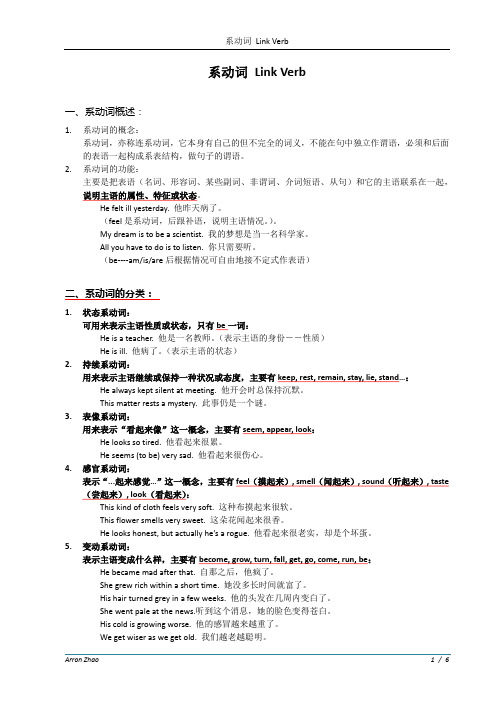
系动词Link Verb一、系动词概述:1.系动词的概念:系动词,亦称连系动词,它本身有自己的但不完全的词义,不能在句中独立作谓语,必须和后面的表语一起构成系表结构,做句子的谓语。
2.系动词的功能:主要是把表语(名词、形容词、某些副词、非谓词、介词短语、从句)和它的主语联系在一起,说明主语的属性、特征或状态。
He felt ill yesterday. 他昨天病了。
(feel是系动词,后跟补语,说明主语情况。
)。
My dream is to be a scientist. 我的梦想是当一名科学家。
All you have to do is to listen. 你只需要听。
(be----am/is/are后根据情况可自由地接不定式作表语)二、系动词的分类:1.状态系动词:可用来表示主语性质或状态,只有be一词:He is a teacher. 他是一名教师。
(表示主语的身份--性质)He is ill. 他病了。
(表示主语的状态)2.持续系动词:用来表示主语继续或保持一种状况或态度,主要有keep, rest, remain, stay, lie, stand…:He always kept silent at meeting. 他开会时总保持沉默。
This matter rests a mystery. 此事仍是一个谜。
3.表像系动词:用来表示“看起来像”这一概念,主要有seem, appear, look:He looks so tired. 他看起来很累。
He seems (to be) very sad. 他看起来很伤心。
4.感官系动词:表示“...起来感觉…”这一概念,主要有feel(摸起来), smell(闻起来), sound(听起来), taste (尝起来), look(看起来):This kind of cloth feels very soft. 这种布摸起来很软。
This flower smells very sweet. 这朵花闻起来很香。
系动词详解(含测试题和答案)

系动词(Linking Verb连系动词)系动词,也称连系动词(Linking verb),是用来辅助主语的动词。
它本身有词义,但不能单独用作谓语,其后必须跟表语,构成系表结构,说明主语的状态、性质、特征等情况。
一、主要系动词及分类二、系动词的句子结构1.系动词(Linking Verb) + 形容词(adj.)例:He looks very happy. 他看起来很高兴。
2.系动词(Linking Verb) + 名词(noun)例:They seem a happy family. 他们看起来是个幸福的家庭。
系动词测试题一、选择题1.The cloth that smooth and soft .A. feels; sells wellB. feels; is well soldC. is felt; sells wellD. is felt; sells good2.Happy birthday, Alice! So you have twenty already.A. becomeB. turnedC. grownD. passed 3.Your suggestion bad.A. hearsB. soundsC. listens toD. listens 4.Later he a doctor.A. becameB. turnedC. grownD. passed5.It's cold.A. becomingB. turningC. goingD. coming 6.The running water makes the stones very smooth.A. soundB. tasteC. smellD. feel 7.— There are dark clouds, and the wind is blowing strongly.— It that a typhoon is coming.A. feelsB. soundsC. seemsD. looks 8.— Three-D printing technology could be used to build a house in less than 24 hours.— It amazing. It’s my first time to get to know the news.A. looksB. smellsC. soundsD. tastes 9.— What will a science museum be like if you are asked to build one?— I hope it will like a book.A. tasteB. soundC. lookD. smell 10.— The medicine awful. I can’t stand it.— I see, Jimmy. But it’s helpful for you.A. tastesB. eatsC. drinksD. takes 11.Mom is cooking dinner. It so nice.A. smellsB. tastesC. feelsD. sounds12.— Do you know the song Gangnam Style?— Of course. It interesting.A. tastesB. smellsC. soundsD. feels 13.Some of my friends eat with their eyes. They prefer to order what nice.A. feelsB. smellsC. looksD. tastes14.I like soft and gentle music. It nice.A. tastesB. looksC. soundsD. feels 15.The meat smells . Throw it away.A. wellB. goodC. badlyD. bad 16.The cookies good. Could I have some more?A. tasteB. smellC. feelD. sound 17.This piece of music beautiful.A. looksB. soundsC. tastesD. smells 18.This kind of paper soft.A. feelsB. tastesC. smellsD. sounds 19.This sentence right. Please write it down.A. feelsB. soundsC. tastesD. smells 20.— I sleepy today.— Drink some tea, and you’ll be good as new.A. feelB. keepC. turnD. grow 21.— How nice the music sounds!— It does! The peaceful music will make you feel .A. excitedB. boredC. movedD. relaxed 22.— Dinner is ready. Help yourself!— Wow! It delicious. Could you please tell me how to cook it?A. tastesB. looksC. soundsD. feels二、根据汉语意思,在空白处填写适当的系动词。
系动词及用法
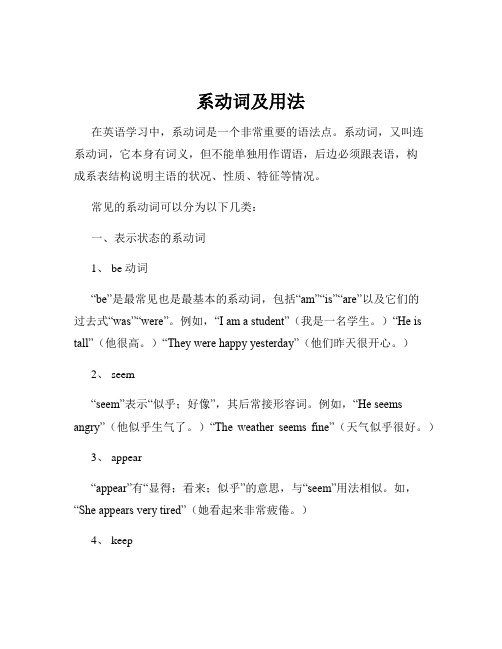
系动词及用法在英语学习中,系动词是一个非常重要的语法点。
系动词,又叫连系动词,它本身有词义,但不能单独用作谓语,后边必须跟表语,构成系表结构说明主语的状况、性质、特征等情况。
常见的系动词可以分为以下几类:一、表示状态的系动词1、 be 动词“be”是最常见也是最基本的系动词,包括“am”“is”“are”以及它们的过去式“was”“were”。
例如,“I am a student”(我是一名学生。
)“He is tall”(他很高。
)“They were happy yesterday”(他们昨天很开心。
)2、 seem“seem”表示“似乎;好像”,其后常接形容词。
例如,“He seems angry”(他似乎生气了。
)“The weather seems fine”(天气似乎很好。
)3、 appear“appear”有“显得;看来;似乎”的意思,与“seem”用法相似。
如,“She appears very tired”(她看起来非常疲倦。
)4、 keep“keep”意为“保持”,强调状态的持续性。
比如,“Keep quiet, please”(请保持安静。
)“You should keep healthy”(你应该保持健康。
)5、 remain“remain”意思是“仍然是;保持不变”。
“The room remains cool all summer”(这个房间整个夏天都保持凉爽。
)6、 stay“stay”有“保持;停留”之意。
“Stay calm”(保持冷静。
)“He stayed single all his life”(他一生都保持单身。
)二、表示感官的系动词1、 look“look”表示“看起来”,常接形容词。
“You look beautiful today”(你今天看起来很漂亮。
)2、 sound“sound”意为“听起来”,其后常接形容词或 like 加名词。
“The music sounds wonderful”(这音乐听起来很棒。
英语系动词有哪些
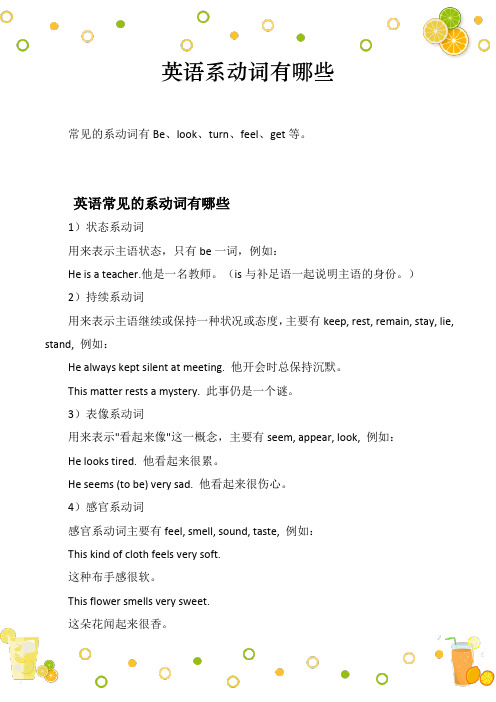
英语系动词有哪些常见的系动词有Be、look、turn、feel、get等。
英语常见的系动词有哪些1)状态系动词用来表示主语状态,只有be一词,例如:He is a teacher.他是一名教师。
(is与补足语一起说明主语的身份。
)2)持续系动词用来表示主语继续或保持一种状况或态度,主要有keep, rest, remain, stay, lie, stand, 例如:He always kept silent at meeting. 他开会时总保持沉默。
This matter rests a mystery. 此事仍是一个谜。
3)表像系动词用来表示"看起来像"这一概念,主要有seem, appear, look, 例如:He looks tired. 他看起来很累。
He seems (to be) very sad. 他看起来很伤心。
4)感官系动词感官系动词主要有feel, smell, sound, taste, 例如:This kind of cloth feels very soft.这种布手感很软。
This flower smells very sweet.这朵花闻起来很香。
5)变化系动词这些系动词表示主语变成什么样,变化系动词主要有become, grow, turn, fall, get, go, come, run.例如:He became mad after that. 自那之后,他疯了。
She grew rich within a short time. 她没多长时间就富了。
6)终止系动词表示主语已终止动作,主要有prove, trun out, 表达"证实","变成"之意,例如:The rumor proved false.这谣言证实有假。
The search proved difficult.搜查证实很难。
His plan turned out a success. 他的计划终于成功了。
系动词的定义
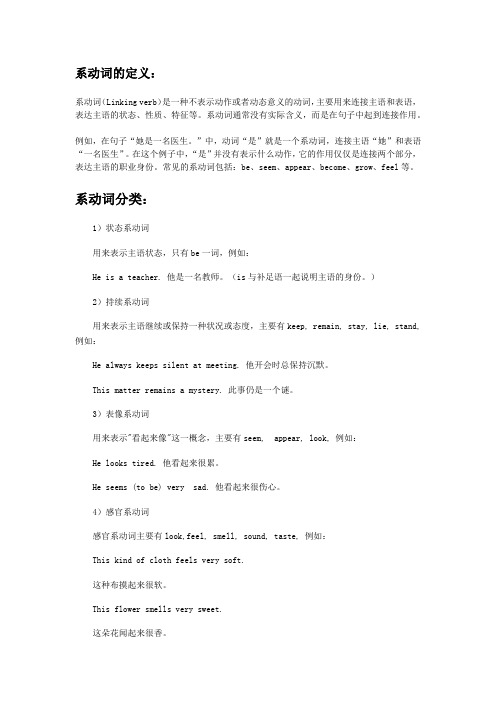
系动词的定义:系动词(Linking verb)是一种不表示动作或者动态意义的动词,主要用来连接主语和表语,表达主语的状态、性质、特征等。
系动词通常没有实际含义,而是在句子中起到连接作用。
例如,在句子“她是一名医生。
”中,动词“是”就是一个系动词,连接主语“她”和表语“一名医生”。
在这个例子中,“是”并没有表示什么动作,它的作用仅仅是连接两个部分,表达主语的职业身份。
常见的系动词包括:be、seem、appear、become、grow、feel等。
系动词分类:1)状态系动词用来表示主语状态,只有be一词,例如:He is a teacher. 他是一名教师。
(is与补足语一起说明主语的身份。
)2)持续系动词用来表示主语继续或保持一种状况或态度,主要有keep, remain, stay, lie, stand, 例如:He always keeps silent at meeting. 他开会时总保持沉默。
This matter remains a mystery. 此事仍是一个谜。
3)表像系动词用来表示"看起来像"这一概念,主要有seem, appear, look, 例如:He looks tired. 他看起来很累。
He seems (to be) very sad. 他看起来很伤心。
4)感官系动词感官系动词主要有look,feel, smell, sound, taste, 例如:This kind of cloth feels very soft.这种布摸起来很软。
This flower smells very sweet.这朵花闻起来很香。
5)变化系动词这些系动词表示主语变成什么样,变化系动词主要有become, grow, turn, fall, get, go, come, run.例如:He became mad after that. 自那之后,他疯了。
系动词讲解
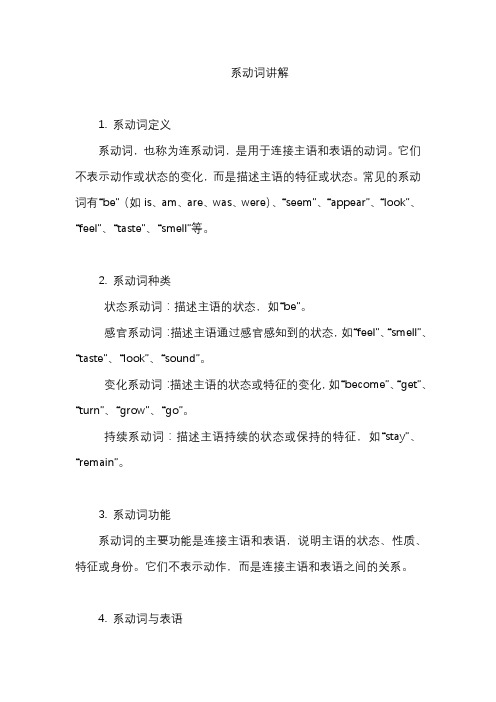
系动词讲解1. 系动词定义系动词,也称为连系动词,是用于连接主语和表语的动词。
它们不表示动作或状态的变化,而是描述主语的特征或状态。
常见的系动词有“be”(如is、am、are、was、were)、“seem”、“appear”、“look”、“feel”、“taste”、“smell”等。
2. 系动词种类状态系动词:描述主语的状态,如“be”。
感官系动词:描述主语通过感官感知到的状态,如“feel”、“smell”、“taste”、“look”、“sound”。
变化系动词:描述主语的状态或特征的变化,如“become”、“get”、“turn”、“grow”、“go”。
持续系动词:描述主语持续的状态或保持的特征,如“stay”、“remain”。
3. 系动词功能系动词的主要功能是连接主语和表语,说明主语的状态、性质、特征或身份。
它们不表示动作,而是连接主语和表语之间的关系。
4. 系动词与表语系动词后通常接表语,表语可以是名词、形容词、副词、介词短语、不定式、动名词等。
表语用来描述或解释主语的状态或特征。
5. 系动词与语态系动词与语态的关系不像动作动词那样直接。
一般来说,系动词没有被动语态。
因为系动词描述的是主语的状态或特征,而不是动作,所以通常不需要使用被动语态。
6. 系动词时态系动词的时态与常见的动词时态相同,包括一般现在时、一般过去时、一般将来时、现在进行时、过去进行时、现在完成时、过去完成时等。
根据具体语境和需要选择合适的时态。
7. 系动词常见错误误用系动词:将动作动词误用作系动词,或将系动词误用作动作动词。
表语与宾语混淆:将表语误认为是宾语,或反之。
时态不一致:系动词与其后的表语时态不一致。
8. 系动词使用技巧明确主语与表语关系:在使用系动词时,首先要明确主语与表语之间的关系,选择合适的系动词来描述这种关系。
注意时态和语态:根据具体语境选择合适的时态和语态,确保句子表达准确。
避免冗余和重复:在使用系动词时,避免冗余和重复,尽量使句子简洁明了。
英语中系动词的概念

英语中系动词的概念系动词是英语中一类非常重要的动词,它们在句子中起到连接主语和表语的作用。
系动词的主要功能是表达主语的状态、性质、特征或身份等,而不是表示具体的动作或行为。
系动词通常可以分为以下几类:1. 状态系动词:这类系动词用于描述主语的状态或情况,常见的有 be(是), seem (似乎), appear(显得), look(看起来), feel(感觉), sound(听起来), taste (尝起来), smell(闻起来)等。
例如:He is a doctor. (他是一名医生。
)2. 持续系动词:这类系动词表示主语持续的状态或行为,常见的有 remain(保持), keep(保持), stay(保持)等。
例如:She remains silent. (她保持沉默。
)3. 变化系动词:这类系动词用于描述主语的变化,常见的有 become(变成), get(变得), turn(变成), go(变得)等。
例如:The weather gets colder. (天气变得更冷了。
)4. 感官系动词:这类系动词用于描述主语的感官印象,常见的有 look(看起来), sound (听起来), feel(感觉), taste(尝起来), smell(闻起来)等。
例如:The music sounds beautiful. (音乐听起来很美。
)系动词在句子中的作用非常重要,它们不仅连接了主语和表语,还提供了关于主语的额外信息。
通过使用系动词,我们可以更准确地描述主语的状态、性质、特征或身份,使句子更加生动、具体和丰富。
同时,系动词还可以与形容词、名词、介词短语等一起构成复合谓语,进一步扩展句子的表达能力。
系动词

三、主 +系动词 + 表语
• 1. 主+系+形容词(S + LV+ adj.) The eggs went bad.
• 2. 主+系+名词(S + LV + n.) It sounds a very good song. • 3. 主+系+副词(S + LV + adv.) They kept together in the struggle. (团结在一起)
2. 系动词 Linking Verb(LV)
一、系动词:
单独使用不能表达一个完整的意思,只有跟 一个表明主语身份或状态的表语才能构成一个 完整的复合谓语。
二、分类: 根据其意义,系动词可分为三类:
• 1)表持续状态(“继续是,保持是”): • lie, keep, continue, stay, hold….. • The letter lay open on his desk. • 2) 表性质、特征(“闻/看/听/感觉/尝/似乎/意思是”): • be, smell, look, sound, feel, taste, appear, seem, mean….. • The soup smelled delicious .
请说下列句子的表语是由什么来充当 ① ② ③ ④ ⑤ ⑥ ⑦ ⑧ ⑨ ⑩ Our teacher of English is an American.(名词) Is it yours?(代词) The weather has turned cold.(形容词) The speech is exciting.(分词) Three times seven is twenty one?(数词) His job is to teach English.(不定式) His hobby is playing football.(动名词) The machine must be out of order.(介词短语) Time is up. The class is over.(副词) The truth is that he has never been abroad.( abroad. 表语从句)
系动词
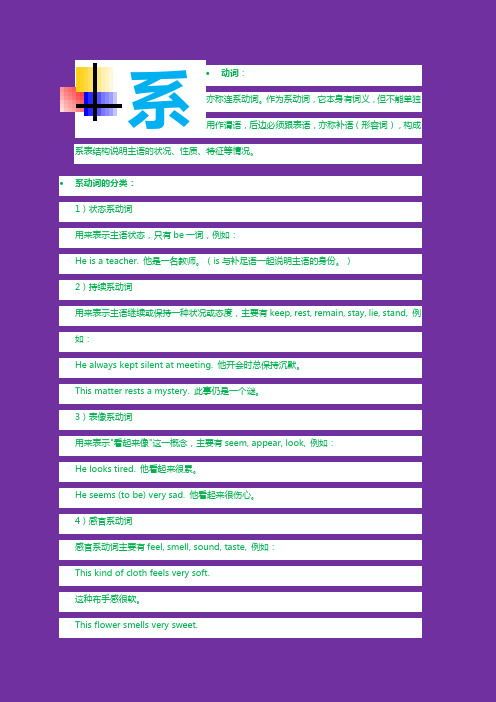
∙动词: 亦称连系动词。
作为系动词,它本身有词义,但不能单独用作谓语,后边必须跟表语,亦称补语(形容词),构成系表结构说明主语的状况、性质、特征等情况。
∙ 系动词的分类:1)状态系动词 用来表示主语状态,只有be 一词,例如: He is a teacher. 他是一名教师。
(is 与补足语一起说明主语的身份。
)2)持续系动词用来表示主语继续或保持一种状况或态度,主要有keep, rest, remain, stay, lie, stand, 例如:He always kept silent at meeting. 他开会时总保持沉默。
This matter rests a mystery. 此事仍是一个谜。
3)表像系动词用来表示"看起来像"这一概念,主要有seem, appear, look, 例如: He looks tired. 他看起来很累。
He seems (to be) very sad. 他看起来很伤心。
4)感官系动词感官系动词主要有feel, smell, sound, taste, 例如: This kind of cloth feels very soft. 这种布手感很软。
This flower smells very sweet.系这朵花闻起来很香。
5)变化系动词这些系动词表示主语变成什么样,变化系动词主要有become, grow, turn, fall, get, go, come, run.例如:He became mad after that. 自那之后,他疯了。
She grew rich within a short time. 她没多长时间就富了。
6)终止系动词表示主语已终止动作,主要有prove, turn out, 表达"证实","变成"之意,例如:The rumor proved false. 这谣言证实有假。
系动词

Complete the speech bubbles in the cartoon below with the correct forms of the linking verbs and the adjectives from the boxes.
get look sound go seem taste
用来表示“似乎”“看来”这一概念的词。
如:seem,appear
He
seems
angry
主语
系动词
表语
感官系动词
用来表示人的感觉的系动词
feel 感觉;摸起来
look
看起来
smell 闻起来
sound 听起来
taste 尝起来
The coat feels comfortable. Twins usually look the same.
变化系动词
表示主语的性质或状态的变化 become,get,go,grow,turn go:
The meat has gone bad in such hot weather.
grow:
My brother is growing tall.
变化系动词
表示主语的性质或状态的变化 become,get,go,grow,turn turn:
(5)_a_r_e_c_l_o_s_e__ to each other, and they always support me.
busy close kind rich wonderful
Paula: What do you usually do with your family? Jerry: Sometimes my family and I go to the
- 1、下载文档前请自行甄别文档内容的完整性,平台不提供额外的编辑、内容补充、找答案等附加服务。
- 2、"仅部分预览"的文档,不可在线预览部分如存在完整性等问题,可反馈申请退款(可完整预览的文档不适用该条件!)。
- 3、如文档侵犯您的权益,请联系客服反馈,我们会尽快为您处理(人工客服工作时间:9:00-18:30)。
系动词: 1, 状态系动词用来表示主语状态,只有be 一词2, 持续系动词用来表示主语继续或保持一种状况或态度如,keep , rest , remain , stay , lie , stand.3,表像系动词, 用来表示“看起来像”. 主要有see , appear, look.4, 感官动词,主要有: feel, smell, sound , taste ,5, 变化系动词, 主要有,become, grow, turn , fall, get, go , come , run6, 终止系动词, 表示主语已终止动作,主要有prove, turn out, 表达证实,变成之意.非限制性定语从句,非限定性定语从句起补充说明作用,缺少也不会影响全句的理解,在非限定性定语从句的前面往往有逗号隔开,如若定语从句有限制性和非限制性两种。
限制性定语从句是先行词不可缺少的部分,去掉它主句意思往往不明确;非限制性定语从句是先行词的附加说明,去掉了也不会影响主句的意思,它与主句之间通常用逗号分开,将非限定性定语从句放在句子中间,其前后都需要用逗号隔开。
分类编辑who引导的非限制性定语从句Our guide,who was a French Canadian,was an excellent cook.我们的向导,一个法裔加拿大人,擅长于烹调。
My gardener,who is very pessimistic,says that there will be no apples this year.我家的园丁非常悲观,他说今年将不结苹果。
whom引导的非限制性定语从句。
关系代词whom用于指人,在句中作动词宾语和介词宾语,作介词宾语时,介词可位于句首。
如:Peter, whom you met in London, is now back in Paris.彼得现在回巴黎了,你在伦敦见过他。
Mr Smith,from whom I have learned a lot,is a famous scientist.史密斯先生是一位著名的科学家,我从他那儿学了许多东西。
whose引导的非限制性定语从句。
whose是关系代词who的所有格形式,在从句中作定语。
whose通常指人,也可指动物或无生命的事物。
如:The boy, whose father is an engineer, studies very hard.那位父亲是位工程师小男孩学习很努力.Above the trees are the mountains, whose magnificence the river faithfully reflects on the surface.在树林的高处是山,其壮丽的景色完全映照在河面上。
The play,whose style is rigidly formal,is typical of the period.这剧本是那个时期的典型作品,风格拘谨刻板。
which引导的非限制性定语从句。
关系代词which在非限制性定语从句中所指代和修饰的可以是主句中的名词、形容词、短语、其他从句或整个主句,在从句中作主语、动词宾语、介词宾语或表语。
①which指代主句中的名词,被指代的名词包括表示物、婴儿或动物的名词、表示单数意义的集体名词以及表示职业、品格等的名词。
如:These apple trees,which I planted three years ago,have not borne any fruit.这些苹果树是我三年前栽的,还没有结过果实。
She is an artist,which I am not.她是一位艺术家,而我不是。
Water,which is a clear liquid,has many uses.水是一种清澈的液体,有许多用途。
The two policemen were completely trusted,which in fact they were.那两个警察完全受到信任,事实上,也真是如此。
②which指代主句中的形容词。
如:She was very patient towards the children,which her husband seldom was.她对孩子们很耐心,她丈夫却很少这样。
She is always careless,which we should not be.她总是马虎大意,我们可不应该这样。
③which指代主句中的某个从句。
如:He said that he had never seen her before,which was not true.他说以前从没见过她,这不是真的。
④which指代整个主句。
如:In the presence of so many people he was little tense, which was understandable.在那么多人面前他有点紧张,这是可以理解的。
He may have acute appendicitis,in which case he will have to be operated on.他可能得了急性盲肠炎,如果是这样,他就得动手术。
When deeply absorbed in work,which he often was,he would forget all about eating and sleeping.他经常聚精会神地工作,这时他会废寝忘食。
when引导的非限制性定语从句。
关系副词when在非限制性定语从句中作时间状语,指代主句中表示时间的词语。
如:He will put off the picnic until May 1st, when he will be free.他将把郊游推迟到5月1号,那时他将有空。
where引导的非限制性定语从句关系。
副词where在非限制性定语从句中作地点状语,指代主句中表示地点的词语。
如:They went to London,where they lived for six months.他们去了伦敦,在那儿呆了六个月的时间。
as引导的非限制性定语从句。
as引出非限定性定语从句时,代替整个主句,对其进行说明但通常用于像as we all know, as it is known, as is known to all, as it is, as is said above, as always mentioned above, as is usual, as is often the case, as is reported in the newspaper等句式中。
as在非限定性定语从句中作主语、表语或宾语,且引出的从句位置比较灵活,可位于句首或句末,也可置于主句中间。
通常均由逗号将其与主句隔开。
as有“正如……,就像……”之意。
如:As is known to the United States, Mark Twain is a great American writer.美国人都知道,马克·吐温是一位伟大的美国作家。
(as在从句中作主语)He forgot to bring his pen with him, as was often the case.他忘了带笔,这是常事。
(as在从句中作主语)He is absorbed in work, as he often was.他正在全神贯注地工作,他过去经常这样。
(as在从句中作表语)As we all know, the earth is round.众所周知,地球是圆的。
(as在从句中作宾语)The two brothers were satisfied with this decision,as was agreed beforehand.两兄弟对此决定都满意,这项决定在事前都已得到他们的同意。
(as在从句中作主语)Taiwan is,as you know,an inseparable part of China.你知道,台湾是中国不可分割的一部分。
(as在从句中作宾语)“介词+关系代词”引导非限制性定语从句:在介词后引导非限制性定语从句。
难:句意相同as it is known to all (that...) (as 做状语从句连词,是状语从句, 可以加that)与as is known to all (as做主语,是定语从句)与it is known to all that... (主语从句,it是形式主语)既:As is widely known, the moon is closer to the us than the sun.(定从)= Thatthe moon is closer to the us than the sun is widely known.(主从)= it is widely known thatthe moon is closer to the us than the sun.(主从)As it is known to everyone, I thought you knew about it too.(状从)[1]关系代词which有时并不代表主句中某一确定的词,而是概括整个主句的意思。
介词的选择取决于它与先行词的搭配或与从句中谓语动词的搭配。
They were short of sticks to make frames for the climbing vines,without which the yield would be halved.他们缺搭葡萄架的杆儿,没有它们产量会减少一半。
They thanked Tom,without whose support they would not have succeeded.他们很感激Tom,没有他的支持他们是不会成功的。
“名词/代词+of+which / whom”It now has 20,000 hectares of land,more than two-thirds of which are under cultivation.现在它拥有两万公顷土地,其中三分之二之多已经耕种。
Light is the fast thing in the world, the speed of which is 300000 kilometer per second.光是世界上最快的东西,它的速度是每秒30万千米。
There are 30 chairs in the small hall, most of which are new.大厅里有三十把椅子,绝大部分是新的。
